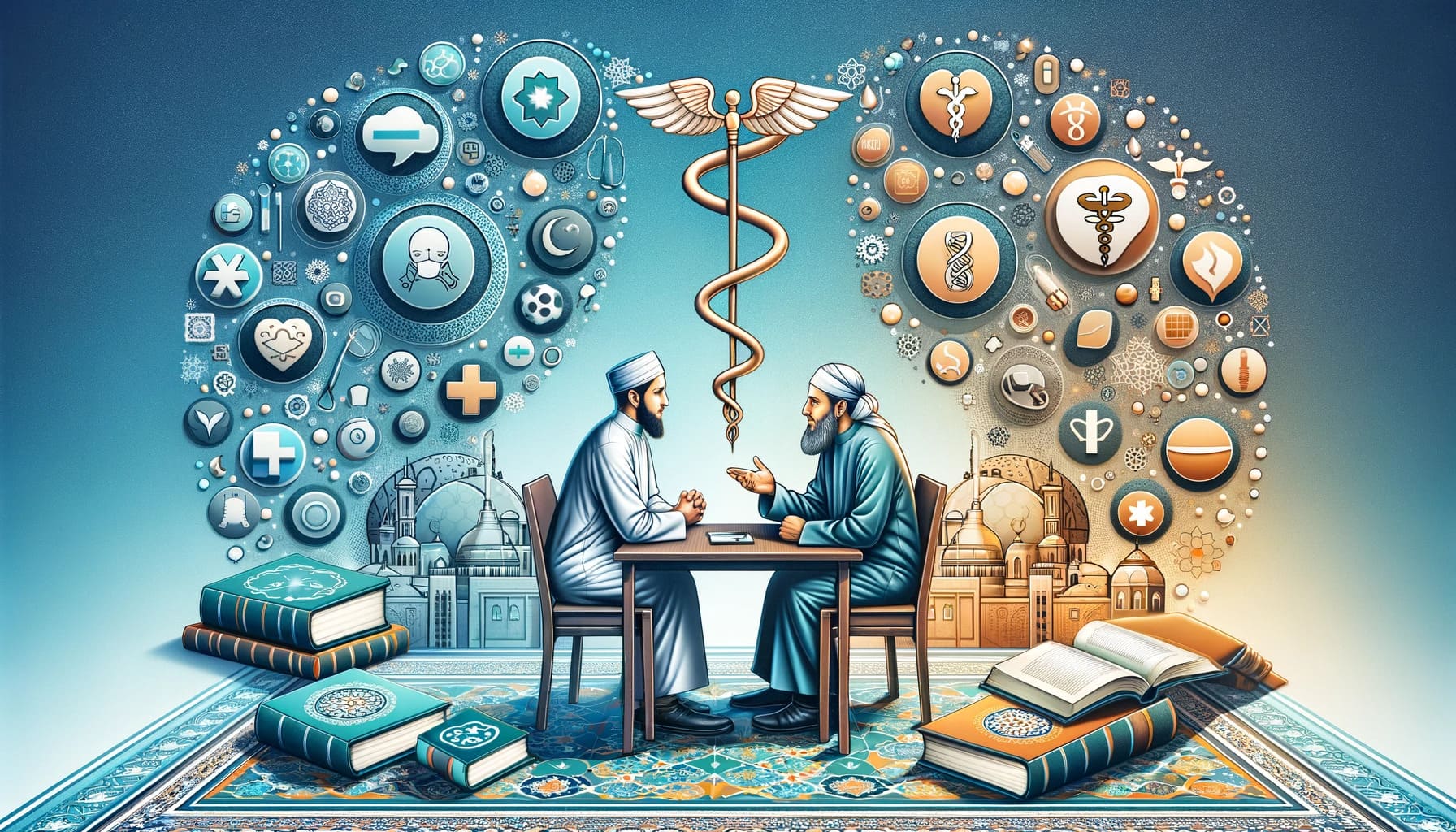Sleep paralysis is a phenomenon that temporarily immobilizes people upon waking or falling asleep. In various cultures, it has its place in medical texts and folklores alike. Sleep paralysis in Islam, with its rich tradition of spirituality and science, offers unique perspectives on such occurrences.
The Scientific and Spiritual Intersection
In the quiet hours of the night, sleep paralysis may unfold as a vivid tapestry of science and spirituality, where both aspects are deeply interwoven within Islamic tradition.
Sleep paralysis is not directly mentioned in the Quran or Hadith, but Islamic teachings provide a holistic approach to understanding physical and spiritual experiences. Islam acknowledges the physical aspects of sleep disorders and advocates for seeking medical advice, while also allowing space for spiritual understanding.

Medical Understanding in Islam
Islam encourages the pursuit of knowledge and understanding of the human body, which includes the study of sleep and its disorders.
- Seeking Knowledge: Emphasizes the importance of learning and understanding the natural world.
- Healthcare Encouragement: Urges the community to seek medical treatment and view it as a form of mercy from Allah.
Spiritual Insights on Sleep Experiences
Islamic tradition also offers a spiritual context for sleep-related experiences, recognizing them as a state where the soul may experience other dimensions of reality.
- The Soul’s Journey: Sleep is sometimes described as a minor form of death, where the soul partially leaves the body.
- Spiritual Interpretations: Some Islamic scholars and traditions might consider sleep paralysis as an encounter with the unseen (Al-Ghaib) or spiritual beings.
Cultural Narratives and Islamic Teachings
As we traverse the boundary between the known and the unknown, cultural narratives within Islamic communities often reflect a deeper search for meaning in the experiences of sleep paralysis.
The cultural fabric of Islam is rich with stories and insights that can provide comfort and understanding to those who experience the unsettling moments of sleep paralysis.

The Role of Jinn in Sleep Paralysis
Sleep paralysis, the experience of being unable to move or speak while transitioning in and out of sleep, has long been a fascinating yet often mysterious phenomenon. It has been observed across different cultures and has even inspired various supernatural theories. In the Islamic world, the concept of Jinn is often integrated into discussions about sleep paralysis.
The Jinn, as mentioned in the Quran, are beings created from smokeless fire and occupy a parallel world to mankind. Some Jinn are benevolent, while others possess mischievous qualities and may be viewed as potentially harmful spirits. When one experiences sleep paralysis, Jinn encounters cannot be ruled out as part of the phenomenon, with these beings inhabiting both the spiritual world and our own. However, there are differing interpretations about how such encounters may or may not be connected.
Protection and Recitation of Verses from the Quran
Some interpretations suggest reciting verses from the Quran may help protect oneself from Jinn-related sleep disturbances. The religious text may serve as both a form of protection during sleep paralysis incidents and a way of banishing any harmful entities that may be negatively impacting one’s sleep. The influence of recitation could strengthen spiritual defenses before bedtime, foster a sense of inner balance, and potentially dispel any mischievous Jinn that may appear during the night.
Protective Duas and Practices
Islam offers several protective practices and supplications (duas) that can be recited for spiritual safety during sleep and upon waking.
- Ayat al-Kursi is a well-known verse from the Quran that is often recited for protection and blessings.
It is found in Surah Al-Baqarah (Chapter 2), Verse 255. The verse is as follows:
“Allah! There is no deity except Him, the Ever-Living, the Sustainer of existence. Neither drowsiness overtakes Him nor sleep. To Him belongs whatever is in the heavens and whatever is on the earth. Who is it that can intercede with Him except by His permission? He knows what is before them and what will be after them, and they encompass not a thing of His knowledge except for what He wills. His Kursi extends over the heavens and the earth, and their preservation tires Him not. And He is the Most High, the Most Great.”
This verse is highly regarded for its significance and is often recited for protection, seeking blessings, and as a means of invoking the presence and power of Allah (God). Many Muslims recite Ayat al-Kursi after each prayer and before going to sleep as a form of spiritual protection.
- Muawwidhat: The last two chapters of the Quran (Al-Falaq and An-Nas) are recitations seeking refuge from various types of harm.
Modern Islamic Perspectives on Sleep Paralysis
In today’s context, Islamic scholars and healthcare professionals often collaborate to offer guidance that respects both religious beliefs and medical insights.
The balance between faith and science is delicately maintained in the Islamic approach to sleep paralysis, ensuring that individuals receive comprehensive care.

The Role of Education
Educating the Muslim community about the nature of sleep paralysis can alleviate fear and superstition, encouraging a proactive approach to this phenomenon.
- Awareness Campaigns: Educating about the natural causes of sleep paralysis.
- Faith-Based Support Groups: Offering community support grounded in Islamic faith and empathy.
Integrating Medical and Spiritual Care
For those experiencing sleep paralysis, a holistic approach that combines medical solutions with spiritual practices is often encouraged.
- Medical Interventions: Professional diagnosis and treatment are prioritized.
- Spiritual Counseling: Spiritual support and guidance in line with Islamic teachings.
Concluding Thoughts: A Balanced View
In Islam, the realms of the seen and unseen coalesce, offering a nuanced perspective on phenomena like sleep paralysis. By embracing both scientific explanations and spiritual practices, Muslims can find solace and solutions in their faith while addressing sleep paralysis with the wisdom of modern medicine.
The journey through the stillness of the night and the enigma of sleep paralysis in Islam is a dance of shadows and light—where faith meets understanding, and fear is dispelled by knowledge. Let this article serve as a bridge between worlds, inviting peace and insight into the hearts of those who walk the path between wakefulness and sleep.
FAQ’s
Is sleep paralysis mentioned in Islam?
Sleep paralysis is not specifically mentioned in Islamic religious texts, but it is a well-known phenomenon that has been observed across cultures and throughout history.
Are there any Islamic beliefs or interpretations related to sleep paralysis?
Some individuals may interpret sleep paralysis experiences through their religious beliefs. In Islam, it is believed that sleep paralysis could be caused by supernatural entities such as jinn or evil spirits. However, these interpretations are not universally accepted and may vary among individuals and cultures.
What are some practical tips for dealing with sleep paralysis in Islam?
If you experience sleep paralysis, it is recommended to seek medical advice to rule out any underlying sleep disorders. In addition, practicing good sleep hygiene, such as maintaining a regular sleep schedule and creating a calm sleeping environment, can help reduce the occurrence of sleep paralysis. Reciting religious verses or prayers before sleep and seeking protection through supplications may also provide comfort to individuals who interpret sleep paralysis through Islamic beliefs.
Are there any specific prayers or supplications to recite for protection from sleep paralysis?
In Islam, there are various prayers and supplications that are believed to provide protection from evil or supernatural entities. Some individuals may choose to recite specific verses from the Quran, such as Ayat al-Kursi (The Throne Verse) or Surah Al-Falaq (The Daybreak), as well as general supplications seeking protection and guidance from Allah.
Are there any Islamic remedies or practices to alleviate sleep paralysis?
In Islam, it is recommended to seek medical advice if experiencing sleep paralysis or any other sleep-related issues. Islamic teachings encourage seeking both medical and spiritual help when facing health-related challenges.


0 Comments